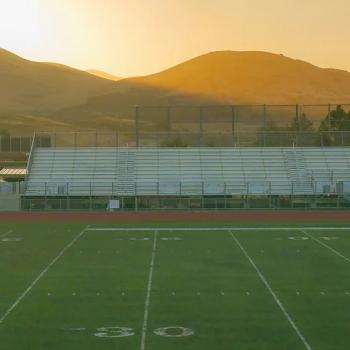If you’re working on planet earth these days, your vocational reality has been changed by COVID-19. While much has shifted, some things have not. These truths provide an unshakable foundation upon which we can fasten our sense of purpose in the storm. I call them anchors of calling. In this post, we unpack the anchor of meaning. God offers us a lens through which our work always has meaning.
Anchor #2: Embracing the Meaning of Your Work
This is good news if:
- Your progress towards your dream job just took a pause. You have taken something else just to survive.
- Your work right now is looking for work.
- You have to work more hours than ever and put some other parts of your life on hold.
We are going to walk through a four-part grid on finding meaning in our vocations, a grid that still applies to work after COVID.
First, we begin with your experience of work. Many of us were introduced to the concept of work when we were children. We were given chores to do. Chores represent work you have to do, so you can get to do what you want to do. “Before you can go play, you have to take out the trash.” But if you are like me, there was another kind of work you did as a child who didn’t feel like work at all.
I liked to build treehouses. They were really just perches, platforms in the air. Building the required great amounts of planning and effort. Find adequate lumber and nails. Gather hammers and saws. Haul this inventory up into the woods. Work. Yet it never felt like work.
The X-Axis is this continuum, somewhere between chore and treehouse. This is our Experience continuum. The Y-Axis has to do with our Why, the lens through which we see our work.
The Secular view of work is simple. I work for me. (I may say it’s to provide for my family. While this line is sometimes true, the truth is often more like “I want to be known as a good provider.”) I work for me and my work is my responsibility. I make it happen. I get it done. Most of us choose our jobs either because we want money or because we want fulfillment. If a job can deliver both, perfect.
I started out in my career with this view of work. I was consumed with everything I needed to get done to achieve my ambitions. I rolled over anyone who got in my way. This led to a crisis of work misery. The pain forced me to reassess my approach to work, it had to be more than just a selfish quest for power and security. A journey up the Y-Axis to the sacred view of work began. Here, work is done for God, with God, and for others. It is outward.
- For God: Paul’s words to the Colossians invite us to do our work unto the Lord, knowing that he will reward us. Sacred work focuses more on for whom than on what you do.
- For others: Martin Luther taught that our work is God’s way of providing for our neighbors. We certainly see God providing for us through those with medical vocations and through everyone keeping the supply chain running.
- With God: God is a builder and protector who promises to work with us as create and make and as we guard and heal (See Psalm 127).
In the sacred frame, I am no longer working as a spiritual orphan, I have a Heavenly Father who cares about my work and helps me in it.
In the sacred frame, I am not longer solely thinking of myself, I am working for the benefit of others. Benefiting others is proven to give us joy and decrease anxiety.
The X and Y Axes net out to four potential meanings in our work: grind, god, gift and growth.
- The grind is chore work, done in the secular frame. It just sucks the life out of you because it’s all about you. You bear 100% of the responsibility to make it happen.
- The god is treehouse work in the secular frame. Work is so good, so fulfilling that we live for it and the security it brings. COVID has some of us facing the death of our god. COVID has others of us working like crazy to keep that god happy. The psalmist said that those who worship false gods, become like them – unable to speak or feel. When we make something a god other than God, that thing robs us of our personhood.
- The gift is treehouse work seen in the sacred frame. Over and over the writer of Ecclesiastes tells us to enjoy your toil under the sun. When you are able to enjoy your toil, this is the gift of God. It may seem cruel to speak of work as a gift during these trying times. Yet most of us can at least find gift elements in our work, even if the job is not ideal. There are components where the challenge of the task calls for the full engagement of our skill and we taste a state of flow.
- The final quadrant is growth. Chore work, approached in a sacred frame, will result in your growth. You grow in perseverance and faith. You weave endurance into your character. You learn things you wouldn’t have learned otherwise, including gratitude.
What if you have to work a “terrible” job to get through the COVID recession? The growth quadrant has an answer. Nothing is lost in the sacred frame. God is not on vacation. He is working on the kind of person you are, preparing you for the future, providing for you through the work of your hands.
Still True in Work After COVID.
This meaning grid is still an anchor of calling as we go to work after COVID.
We still bring our purpose to our work instead of driving our purpose from our work. We choose whether to framework our work as secular or sacred.
No matter what kind of work you have to do to get through this crisis, God is still ready to receive that work as worship. He is still ready to work with you. And he still wants to use that work to provide for others.
I believe some of us may even discover some surprise gift, we will be ambushed by some unexpected joy in work we didn’t really choose.
How About You?
- What kind of meaning did you experience most in your work pre-COVID: grind, god, gift or growth? Why?
- Using the meaning grid, how are COVID job changes tempting you to change your approach to work?
- What are some practices you can put into place to work above the line in the sacred frame when your work is mostly chores or mostly treehouse?
About the Author
Dr. Chip Roper writes Marketplace Faith from New York City, where he is Founder and President of the VOCA Center. Under Chip’s leadership, the VOCA team rescues clients like you from the forces that rob them of effectiveness and joy at work. With over 30 years of executive responsibility and experience successfully navigating career change, Dr. Chip and his team at VOCA are well-positioned to be a resource to you and your team. VOCA provides coaching, training, and consulting to individuals and organizations in NYC and beyond. Visit our faith-based website at vocacenter.org and our market-facing menu of services at www.vocacenter.com.













